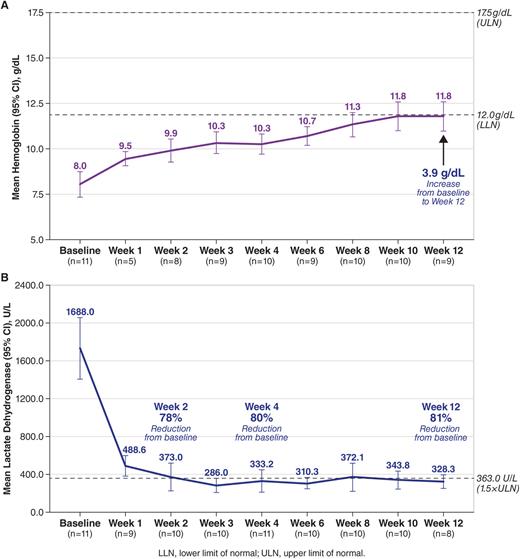Abstract
Introduction: Paroxysmal nocturnal hemoglobinuria (PNH) is a rare hematopoietic stem cell disorder characterized by a deficit of complement inhibitory proteins on the blood cell surface, causing intravascular hemolysis (IVH) and risk of thrombosis owing to terminal complement activation. Treatment of patients with PNH with complement C5 inhibitors has greatly improved clinical outcomes and survival; however, some patients taking C5 inhibitors develop clinically significant extravascular hemolysis (EVH) that may result in symptomatic anemia and require blood transfusions. Thus, when treating PNH, complete and sustained terminal complement inhibition is needed. Pharmacologic inhibition of factor D, the rate-limiting enzyme of the complement alternative pathway (AP), even as a monotherapy, may control IVH while preventing EVH, eventually improving anemia and the need for transfusions. The oral factor D inhibitor ALXN2040 (danicopan) showed efficacy as a monotherapy and an add-on treatment to the C5 inhibitor eculizumab, but there was suboptimal control of IVH in some patients when used as a monotherapy. A latter oral factor D inhibitor, ALXN2050 (vemircopan), has the same mechanism of action as danicopan but demonstrates increased potency and binding affinity for factor D. It also achieves immediate, complete, and sustained AP inhibition with twice-daily administration (BID). Vemircopan is being investigated in a phase 2 proof-of-concept study as a monotherapy to treat patients with PNH.
Methods: This is an ongoing, phase 2, open-label study (NCT04170023) to assess the efficacy, safety, and PK/PD of vemircopan monotherapy in patients with PNH. The study comprises a 60-day screening period, a 12-week treatment period, and a 96-week long-term extension. Three patient groups are included: treatment-naïve, eculizumab switch, and danicopan monotherapy rollover. This interim analysis focuses on efficacy and safety data from the treatment-naïve group to establish proof of concept in PNH. Key inclusion criteria for the treatment-naïve group include lactate dehydrogenase (LDH) ≥1.5 × upper limit of normal (ULN), absolute reticulocyte count ≥100x109/L, and anemia (hemoglobin [Hgb] <10.5 g/dL). Patients receive vemircopan 120 mg BID, which can be escalated to 180 mg BID per investigator discretion based on guidelines in the protocol (Hgb has not increased by ≥1 g/dL by week 4 relative to baseline; blood transfusion needed; or LDH >1.5 × ULN by day 14 in 2 consecutive assessments). Primary endpoint is change from baseline to week 12 in Hgb. Key secondary endpoints include change from baseline to week 12 in LDH and Functional Assessment of Chronic Illness Therapy - Fatigue (FACIT-Fatigue) score. Safety is reported as treatment-emergent adverse events (TEAEs).
Results: As of a data cutoff date of April 30, 2022, 11 treatment-naïve patients were enrolled (mean [SD] age, 44.4 [17.8] y; 63.6% male; 72.7% Asian, 54.5% received transfusions during screening period). Nine patients completed 12 weeks in the study and were included in this analysis. From baseline to week 12, mean (SD) Hgb increased by 3.9 (1.11) g/dL from 7.9 (1.29) g/dL to 11.8 (1.25) g/dL (Fig. 1A), LDH rapidly decreased by 81% from 7 × ULN to 1.4 × ULN (Fig. 1B), absolute reticulocyte count decreased from 212.4 (86.47) x 103/uL to 120.0 (51.44) x 103/uL, and a 13-point improvement in FACIT-Fatigue score was observed. No patients needed transfusions except 1 case on day 2 owing to low Hgb (5.1 g/dL). As of the data cutoff date, 31 TEAEs were reported (n=9 patients); most (25/31; 80.6%) were considered unrelated to study drug. No serious TEAEs, grade ≥3 TEAEs, discontinuations, or deaths were reported. The most common TEAE was headache (n=4; 36.4%). There were no thrombotic events, seizures, or meningococcal infections. Thus far, 7 of 11 patients received dose escalation from 120 mg BID to 180 mg BID, which was associated with increased Hgb levels.
Conclusions: This interim analysis of treatment-naïve patients with PNH suggests that monotherapy with vemircopan controlled IVH (reduction in LDH to almost normal levels) and prevented EVH (clinically meaningful increases in Hgb values, reticulocyte count reductions). No new safety signals were identified during the 12-week evaluation period. This interim efficacy and safety analysis provides proof of concept in PNH and suggests that phase 3 trials of vemircopan in patients with PNH are warranted.
Disclosures
Browett:BeiGene: Research Funding; Abbvie: Honoraria; Arrowhead: Honoraria; Eysa Pharma: Membership on an entity's Board of Directors or advisory committees; Janssen: Membership on an entity's Board of Directors or advisory committees; MSD: Honoraria; Roche: Research Funding. Kulasekararaj:Pfizer: Consultancy, Honoraria, Speakers Bureau; Novartis: Consultancy, Honoraria, Research Funding, Speakers Bureau; Ra Pharma: Consultancy, Honoraria, Speakers Bureau; Novo Nordisk: Consultancy, Honoraria, Speakers Bureau; Sobi: Consultancy, Honoraria, Speakers Bureau; Samsung: Consultancy, Honoraria, Speakers Bureau; F. Hoffmann-La Roche: Consultancy, Honoraria, Speakers Bureau; Celgene: Consultancy, Honoraria, Research Funding, Speakers Bureau; Biocryst: Consultancy, Honoraria, Speakers Bureau; Apellis: Consultancy, Honoraria, Speakers Bureau; Amgen: Consultancy, Honoraria, Speakers Bureau; Alexion, AstraZeneca Rare Disease: Consultancy, Honoraria, Speakers Bureau; Akari: Consultancy, Honoraria, Speakers Bureau; Achillion: Consultancy, Honoraria, Speakers Bureau. Notaro:Alexion, AstraZeneca Rare Disease: Honoraria, Membership on an entity's Board of Directors or advisory committees; Biocryst: Membership on an entity's Board of Directors or advisory committees; SOBI Pharmaceuticals: Membership on an entity's Board of Directors or advisory committees. Ogawa:Alexion, AstraZeneca Rare Disease: Current Employment, Current equity holder in private company. Risitano:Pfizer: Honoraria, Speakers Bureau; Roche: Membership on an entity's Board of Directors or advisory committees; Alexion: Honoraria, Membership on an entity's Board of Directors or advisory committees, Research Funding, Speakers Bureau; Sobi: Honoraria, Membership on an entity's Board of Directors or advisory committees, Speakers Bureau; Apellis: Honoraria, Membership on an entity's Board of Directors or advisory committees, Speakers Bureau; Novartis: Honoraria, Membership on an entity's Board of Directors or advisory committees, Research Funding, Speakers Bureau; Alnylam: Research Funding; Ra Pharma: Research Funding; Achillion: Membership on an entity's Board of Directors or advisory committees; Samsung: Membership on an entity's Board of Directors or advisory committees; Amyndas: Consultancy. Yu:Alexion, AstraZeneca Rare Disease: Current Employment, Current equity holder in private company.
Author notes
Asterisk with author names denotes non-ASH members.


